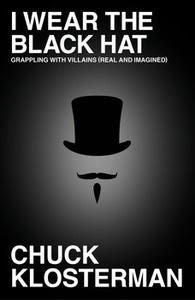Take a photo of a barcode or cover
Klosterman makes sweeping, unsupported generalizations and assumes the audience will agree with him. The radical shifts between too much evidence for inconsequential details and no evidence for important points made this book difficult to follow and impossible to take seriously.
I've enjoyed Klosterman's other collections but this one was a bit much for me. It felt like the references were largely sports-related, which just didn't hit me. The collection of thoughts on villainy and how we view them felt muddled and without much point (as there's no real conclusive wrap-up).
Chuck Klosterman returns with another outstanding collection of essays, this time focused on the concept of villainy. Klosterman brings his unique style of applying highbrow philosophical and critical analysis to bear on topics and issues of "low" pop culture, and the results are thought provoking, interesting, and more times than not, slightly humorous. This collection has me thinking more and more about the idea of villainy, and who we consider villains and why. Klosterman explores the long debated question of whether villains think of themselves as villains, and also touches on the idea of history being written by the winners. Ultimately, Klosterman comes up with an interesting theory . . . that villains are the people that know the most, and care the least. An interesting way to think about villainy, and at least through the prism of his essays, the idea holds up.
Highly suggested . . .
Highly suggested . . .
interesting and thought provoking.....plus now I can deliver the excellent "you know, Hitler was a vegetarian" line when a vegan zealot gets between me and my bacon
I loved this. A wild ride through an eccentric mind, like all of Chuck Klosterman's work. He lost me a little in the chapter on con men, which ended with a comparison of the 9/11 terrorists to D.B. Cooper, a man who hijacked a plane to steal $200K and make an escape, all while remaining a "gentleman" (i.e. friendly to the flight attendants, non-threatening to passengers). The conclusion of the argument gives the impression that Klosterman sees the difference between the two hijackers as a matter of confidence. It's not that I find this argument offensive, because I know it's not the actual argument he's making. But it seems like a bit of loose construction from a writer who's all about the strange but tightly constructed argument. I also think he took the easy way out of the Hitler chapter by making it so much about the writing of the chapter.
Overall, maybe my favorite Klosterman book so far!
Overall, maybe my favorite Klosterman book so far!
"The villain is the person who knows the most but cares the least."
Very Klosterman. The OJ stuff was the best. I enjoyed it but found it infuriating, as with all latter-day Klosterman. That's about all I've got.
I have a hard time rating books like this.
Do I think the book to be a profound achievement? No. But it was quite entertaining, it even evoked a number of laughs-out-louds, which is an achievement for any book. Klosterman, as he often does, got me thinking about various topics and people in a way I hadn't before.
So it's been a mental struggle between 3 stars and 4. Maybe the rating system itself is inherently problematic in that there is no consistency as to what each star means to me let alone what it means to other people. But this is an argument that I am sure has been waged before in other reviews and forums.
So fuck it, this is a 4 star book of pop-nonfictional popular culture criticism; or some other less dumb arrangement of words that mean what I am really trying to say but can't.
Do I think the book to be a profound achievement? No. But it was quite entertaining, it even evoked a number of laughs-out-louds, which is an achievement for any book. Klosterman, as he often does, got me thinking about various topics and people in a way I hadn't before.
So it's been a mental struggle between 3 stars and 4. Maybe the rating system itself is inherently problematic in that there is no consistency as to what each star means to me let alone what it means to other people. But this is an argument that I am sure has been waged before in other reviews and forums.
So fuck it, this is a 4 star book of pop-nonfictional popular culture criticism; or some other less dumb arrangement of words that mean what I am really trying to say but can't.
This is the second novel by Klosterman that I've read (the first being But What If We're Wrong?) and I'm super disappointed. There were very little new or original ideas and most of the references were boring and too drawn out. Though there were some interesting chapters, many were pointless. This book felt unorganized, repetitive, and pointless.
I think I've just said this. Interesting but not intriguing.




